Why is Wales used as a unit of measurement?
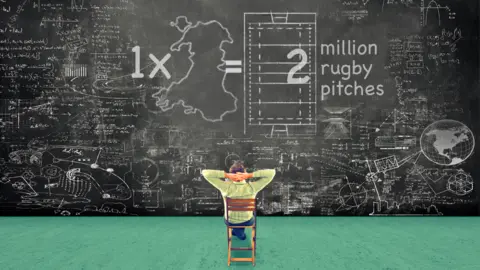 Getty Images
Getty ImagesWhen you think of Wales, what comes to mind? Land of song? Rugby? Or a useful tool for measuring everything from deforestation to the destruction caused by nuclear bombs?
Chances are you've heard someone say - or read in an article - that something is "the size of Wales".
That's all well and good, but surely even the most ardent patriot couldn't tell you how big Wales is, so why has it become such a convenient yardstick?
First things first: How big is the Land of My Fathers?
It's about 8,194 sq miles (21,224 sq km) - or 2,122,400 hectares.
Put simply, your typical rugby pitch is about one hectare, give or take.
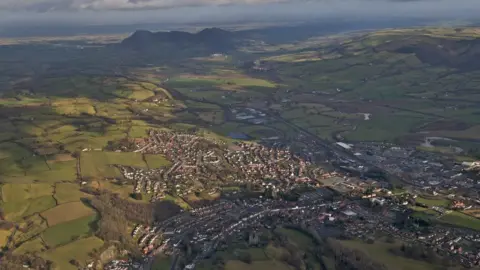
Now you can picture it, why is it people tend to reference it when talking about size?
It's been used to describe the area an asteroid could wipe out if it hit the Earth and - perhaps literally and descriptively - how much damage a nuclear bomb could cause.
Swansea University's Prof Adrian Luckman leads Project Midas, which has monitored iceberg A-68 since it broke away from the Larsen C ice shelf in Antarctica in 2017.
He needed a way to put the size of the trillion-tonne iceberg into context so the average person could comprehend it, so turned his eyes to home.
"The giant block is estimated to cover an area of roughly 6,000 sq km; that's about a quarter the size of Wales," a BBC report at the time read.
So what made him choose Wales?
"People in general find it easier to appreciate the size of geographical features when they are related to other known features, than when they are presented in units of, say square km," Prof Luckman said.
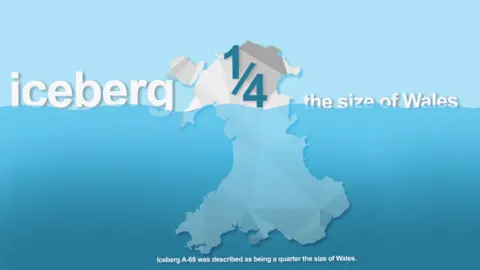
"This is especially true for very large objects such as iceberg A-68. Giving a geographical comparison allows the reader to imagine how long it would take to walk or drive across them, for instance.
"More prosaically, Wales has been used many times before as an area comparison, we live in Wales, and iceberg A-68 is a relatable fraction of the area of Wales, so it seemed like a very natural comparison to make."
The use was so widespread, founders of conservation charity Size of Wales picked it for its name.
Established in 2010, its original goal was to help protect an area the size of Wales from deforestation - which it achieved in 2016.
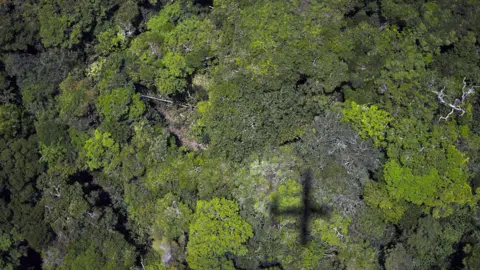 Getty Images
Getty ImagesDirector Elspeth Jones said: "'An area the size of Wales' is frequently used to measure the rate of forest destruction. Our founders wanted to turn that negative use of the country's size on its head and make it a measure of something positive.
"It's almost impossible to imagine how big two million hectares is without a reference point. Using 'the size of Wales' helps to illustrate the scale.
"For example, when you tell people that roughly 12 million hectares of tropical forest is destroyed each year, the sheer scale of that doesn't register.
"When you realise that is an area of tropical forest roughly six times the size of Wales, you can start to picture the scale of the forests and of the problem."
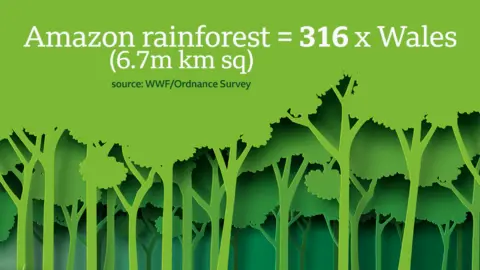 Getty Images
Getty ImagesBut how new is this global-scale ruler?
Google's Ngram Viewer - which allows you to search words or phrases and how often they have been mentioned in millions of words in books dating back hundreds of years - suggests it has been around for a while.
While not definitive, and there are other reasons why the phrase could appear, "about the size of Wales" first shows up in texts in 1844 and peaked in popularity in 1949.
One wonders - if you laid out all the pages of those books next to each other - what size the area would be...

This story was inspired by a question sent to us by Nicky Churchill from Goodwick, Pembrokeshire.
She said: "It was one of those silly, surreal things - we'd heard two or three times in a row on some TV programme that something was the size of Wales.
"We wondered why it was held as a standard for things so diverse - it just came from a late night conversation after a glass of wine."
What questions do you have about Wales, or its people and places?
Is there anything you've always wanted to know?
Use this form to send us your questions:
If you are reading this page on the BBC News app, you will need to visit the mobile version of the BBC website to submit your question on this topic.
We may get in touch if we decide to follow up on your suggestion.
